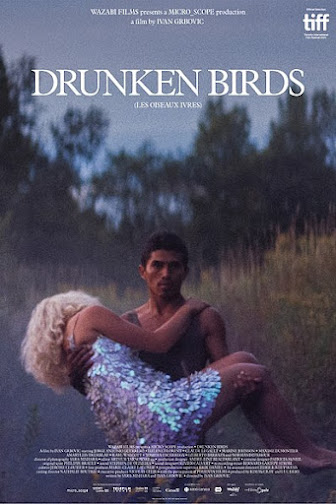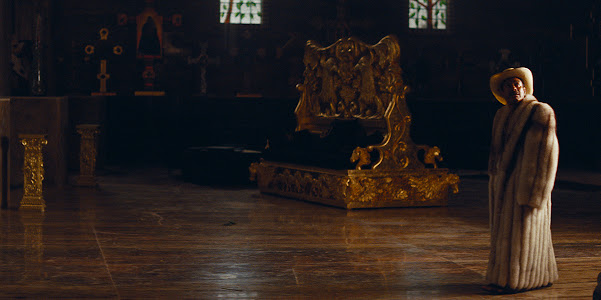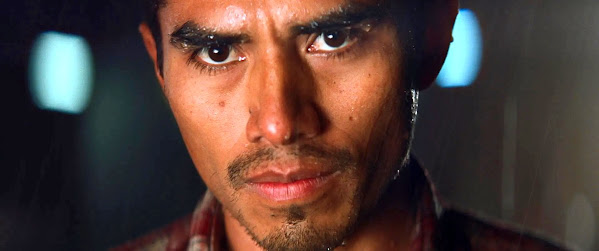By José Alberto Hermosillo
Stunningly photographed and well-executed, “Drunken Birds” reveals its three uniquely opposite characters' beliefs, actions, and passions with poetic regard.
“Drunken Birds” centers its narrative on love, abandonment, and coming-of-age memories. Divided into three acts just as “Days of Heaven,” “Amores Perros,” and “Magnolia,” the Canadian production unfolds a compelling dramatization not far from reality.
Inspired by the seasonal migrant workers in Canada, the film opens with a young man arriving at an apartment complex in Montréal and continues with a flashback set in Mexico, showing a mansion complete with white tigers and other abandoned unrestrained animals. Then, a portrait of a man who, more than a patriarch, is a drug lord. He is spending some time in prison because someone betrayed him.
The place holds a secret of a love triangle, in which Willi (Jorge Antonio Guerrero) falls for Narco’s wife, Marlena (Yoshira Escárrega). Fearing for their lives, the young lovers flee to Canada in opposite directions.
At the Ferme, Vinet – one of the oldest agricultural centers outside Quebec – Willi, among other seasonal workers, learns the rules and responsibilities of harvesting lettuces. Four years pass, and Willy still misses Marlena, the love of his life.
It is hard to forget a loved one, even in a tranquil oasis.
The story takes a dramatic turn when Willi crosses paths with Julie (Hélène Florent), the neglected owner of a Canadian farmhouse, and her precocious teenage daughter, Lea (Marine Johnson), who only wants to have fun in the city.
The complications are straightforward when their past confronts their present. Although, the conundrum keeps us wondering about possible resolutions. Everything becomes chaotic when Lea’s silence implicates Willi of wrongdoing.
The brief flashbacks diffuse the story’s emotional context, but the imagery’s beauty holds the narrative well.
“Drunken Birds” is also inspired by the 2011 Mexican Oscar entry “Miss Bala.” The script details the countries where the stories occur: Mexico, Canada, and China.
The well-balanced cinematography is Sara Mishara's responsibility. She accomplishes cinematic glory by splendidly capturing the “magic hour” lighting. Sara shot the project “Old School” with a 35mm camera. The film’s grain gave her the convenience of having plenty of depth in the long shots and enhancing the close-ups with clarity, giving the movie the desired “dreamlike style.”
According to its director Ivan Grbovic, “the characters of this intriguing triptych have different personalities with multidimensional layers that are not necessarily likable, although their behaviors are driven by love, desire or curiosity.” He added, “In this puzzle, all the pieces do not always fall together but are equally important.”
The
independent production has the potential for greatness with limited resources, although the “bad hombres” entrance to the hacienda in Mexico needed to
be choreographed better. There are plenty of other films where the tension is in sync with a festive atmosphere
denoted in local productions such as Luis Puenzo’s “Old Gringo,” Baz
Luhrmann’s “Romeo + Juliet,” or Ruy Guerra’s “Eréndida.”
Winner of Best Cinematography at the Philadelphia Film Festival, “Drunken Birds” premiered at the Toronto International Film Festival. It was selected as the Canadian Best International Feature Film entry at the 94th Academy Awards.
Willi’s noble heart tells him to help the needy, which is in his nature, even if that causes trouble with dramatic consequences in his immediate future. We have to remember that no one is guilty until proven otherwise, and no one is blameworthy until the truth comes out, but certainly, we are not sure if that will ever happen in fiction.
The filmmakers said that people in Canada compared the word “drunk” with love or joy and birds with unity and migration. It is like the birds’ flock moving together instinctively in complete freedom, just as we relate to the film’s character’s stories effortlessly.
The climax of “Drunken Birds” or “Les Oiseaux ivres” comes when the three stores converge at one point. At that precise moment, justice is needed at most, but the irony is that we cannot always get what we want in life, and we have to remember that the biggest enemy of all is silence.
“Roma” Anarchy and Repression in an Epic B&W Mexican Drama
“Birdman or (The Unexpected Virtue of Ignorance)”
IF YOU ARE READING FROM A MOBILE DEVICE, CLICK: view web version FOR OTHER COOL FEATURES SUCH AS TRANSLATE POWERED BY GOOGLE, AN INTERACTIVE FILM FESTIVAL CALENDAR, AND MORE AWESOME ARTICLES.
Festival in LA ©2021








No comments:
Post a Comment